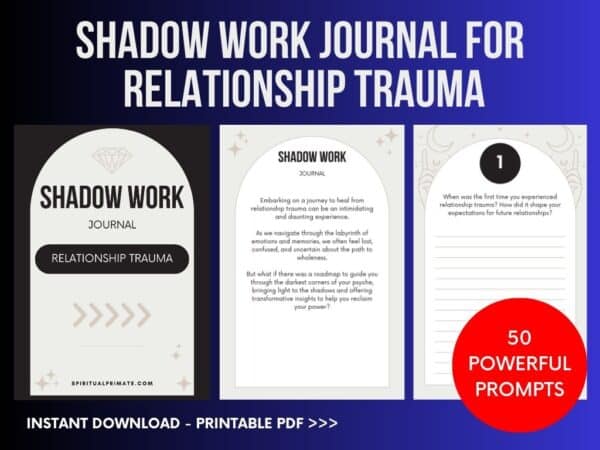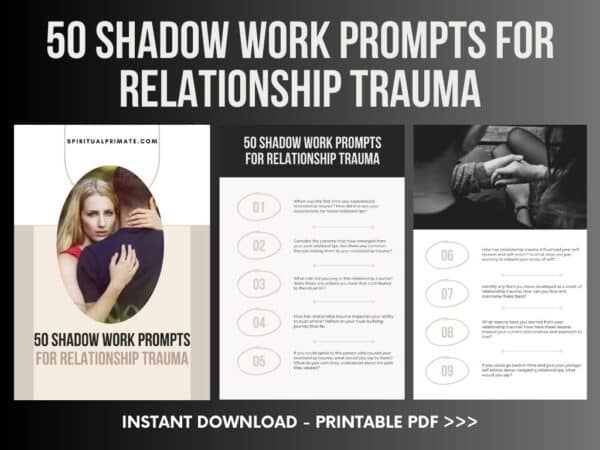Embarking on a journey to heal from relationship trauma can be an intimidating and daunting experience. As we navigate through the labyrinth of emotions and memories, we often feel lost, confused, and uncertain about the path to wholeness.
But what if there was a roadmap to guide you through the darkest corners of your psyche, bringing light to the shadows and offering transformative insights to help you reclaim your power?
Enter the world of shadow work, where self-discovery and emotional healing become the keys to unlocking your true potential. In this guide, we present “50 Transformative Shadow Work Prompts: Unravel Relationship Trauma and Rekindle Self-Love and Emotional Healing.”
Are you ready to embark on this life-changing journey and become the best version of yourself?

Understanding Relationship Trauma
Relationship trauma refers to the emotional and psychological distress that results from experiencing negative events or situations within a close relationship. This type of trauma can result from various scenarios, such as abusive or toxic relationships, infidelity, betrayal, or the sudden loss of a loved one.
When we experience relationship trauma, our sense of trust, security, and self-worth can be significantly impacted. This can manifest as feelings of anxiety, depression, anger, and even physical symptoms such as insomnia, fatigue, or a weakened immune system.
The effects of relationship trauma can be far-reaching, as they can disrupt our ability to form and maintain healthy connections with others in the future. Moreover, unresolved trauma can lead to the development of unhealthy coping mechanisms, such as substance abuse or self-destructive behaviors.
It’s essential to recognize and address relationship trauma to foster emotional healing and personal growth. This process often involves seeking professional help, such as therapy or counseling, in addition to engaging in self-reflection and self-care practices to rebuild self-esteem and trust in others.
In summary, relationship trauma is a deeply impactful emotional experience resulting from negative events within close relationships. Recognizing and addressing this trauma is crucial for personal well-being and the ability to form healthy connections with others moving forward.

Healing Relationship Trauma Through Shadow Work
Relationship trauma can leave deep emotional and psychological scars, affecting our ability to connect with others and even ourselves. Shadow work, a self-exploration process that involves addressing and embracing our hidden aspects, can help heal these wounds and lead to healthier relationships.
Understanding Shadow Work
Shadow work is a psychological practice, rooted in the theories of Carl Jung, which focuses on exploring and integrating the unconscious, “darker” aspects of ourselves that we may have repressed or denied. These repressed parts of ourselves, known as the shadow, often manifest in our relationships, leading to unhealthy patterns and unresolved emotional baggage. By acknowledging and confronting our shadow, we can gain insight into our past traumas and develop self-awareness, ultimately fostering healthier connections with others.
The Connection Between Shadow Work and Relationship Trauma
When we experience relationship trauma, we often develop defense mechanisms and coping strategies to protect ourselves from further pain. These mechanisms can include denial, avoidance, or projection of our own unresolved emotions onto others. Over time, these patterns can become ingrained, leading to unhealthy relationships and perpetuating the cycle of trauma. Shadow work helps us identify and address these unconscious patterns, allowing us to heal and break free from their grip.
Steps to Undertake Shadow Work for Healing Relationship Trauma
1. Self-Reflection and Journaling: Begin by spending time in introspection, examining your thoughts, emotions, and past experiences. Journaling is an effective tool for this process, as it allows you to express your feelings and gain deeper insight into your shadow aspects.
2. Identify Patterns and Triggers: Look for recurring themes in your relationships, such as unhealthy communication, codependency, or trust issues. Reflect on the situations and circumstances that trigger these patterns, as they may provide clues to the underlying trauma.
3. Acknowledge and Accept Your Shadow: Recognize the aspects of yourself that you may have been repressing or denying. Embrace your shadow as a part of you, accepting it without judgment or shame.
4. Seek Professional Guidance: Shadow work can be an intense process, and it’s essential to have support from a qualified therapist or counselor. They can provide guidance, tools, and techniques to navigate the complex emotions and experiences that may arise during your journey.
5. Practice Self-Compassion: Be kind and gentle with yourself throughout the process of shadow work. Understand that healing takes time, and it’s crucial to nurture and care for yourself as you confront your past traumas.
6. Forgiveness and Release: As you gain insight into your relationship trauma and the role your shadow has played, work on forgiving yourself and others. Release the emotional baggage you’ve been carrying, allowing yourself to move forward with a lighter heart.
7. Create New, Healthy Patterns: As you heal from your past traumas, it’s essential to establish new patterns and habits that promote healthy relationships. This may involve setting boundaries, improving communication skills, and developing a stronger sense of self-worth.
Shadow work is a powerful tool for healing relationship trauma and fostering healthier connections with others. By confronting and integrating our shadow aspects, we can break free from the cycle of trauma and develop greater self-awareness and emotional resilience. Remember, healing takes time, and it’s essential to be patient and compassionate with yourself throughout the process. With dedication and support, shadow work can lead to profound personal growth and the ability to form and maintain healthy relationships.

Shadow Work Prompts for Relationship Trauma
1. When was the first time you experienced relationship trauma? How did it shape your expectations for future relationships?
2. Consider the patterns that have emerged from your past relationships. Are there any common threads linking them to your relationship trauma?
3. What role did you play in the relationship trauma? Were there any actions you took that contributed to the situation?
4. How has relationship trauma impacted your ability to trust others? Reflect on your trust-building journey thus far.
5. If you could speak to the person who caused your relationship trauma, what would you say to them? What do you wish they understood about the pain they caused?
6. How has relationship trauma influenced your self-esteem and self-worth? In what ways are you working to rebuild your sense of self?
7. Identify any fears you have developed as a result of relationship trauma. How can you face and overcome these fears?
8. What lessons have you learned from your relationship trauma? How have these lessons shaped your current relationships and approach to love?
9. If you could go back in time and give your younger self advice about navigating relationships, what would you say?
10. How do you protect yourself from further relationship trauma? What boundaries have you set to ensure your emotional safety?
11. What resources, support systems, or tools have you utilized in your healing journey from relationship trauma?
12. How has relationship trauma affected your communication style? Are there any areas where you could improve your communication skills to foster healthier relationships?
13. What does forgiveness look like to you in the context of relationship trauma? Have you forgiven yourself and the person who caused the trauma? Why or why not?
14. How do you show empathy and compassion for yourself as you heal from relationship trauma?
15. In what ways has relationship trauma led you to seek personal growth and self-improvement?
16. How do you balance vulnerability and self-protection in your relationships to prevent further trauma?
17. How has relationship trauma affected your view of love and commitment? Are these views evolving as you heal?
18. Describe a moment when you felt a sense of closure or healing from your relationship trauma. What led to this breakthrough?
19. How do you honor and validate your feelings regarding your relationship trauma without allowing them to consume you?
20. What aspects of your life have improved as a result of your healing journey from relationship trauma?
21. How has relationship trauma influenced your ability to set and maintain boundaries in your relationships?
22. What does a healthy, fulfilling relationship look like to you? How are you working towards creating that in your life?
23. How has relationship trauma impacted your connection with your inner child? Are you nurturing and caring for this part of yourself?
24. In what ways has relationship trauma led you to develop resilience and inner strength?
25. How do you maintain hope for future relationships despite your past relationship trauma?
26. What self-care practices have you incorporated into your life to support your healing from relationship trauma?
27. How do you recognize and acknowledge red flags in relationships to prevent further trauma?
28. How has relationship trauma shaped your understanding of love, and what does love mean to you now?
29. What aspects of your identity have you rediscovered or embraced as you heal from relationship trauma?
30. How do you honor your past experiences and relationship trauma without letting them define you?
31. What does it mean to be a survivor of relationship trauma? How do you embody that strength in your daily life?
32. How have your friendships and support networks shifted as you navigate healing from relationship trauma?
33. What role does self-love play in your healing journey from relationship trauma?
34. How do you cultivate patience and grace for yourself as you work through the effects of relationship trauma?
35. How do you approach new relationships with a sense of openness and curiosity, rather than fear and trepidation?
36. In what ways has relationship trauma offered opportunities for personal growth and transformation?
37. How do you practice gratitude for the lessons and growth that have come from your relationship trauma?
38. How do you create and maintain a safe space for yourself and others in your relationships?
39. What does emotional healing look like to you, and how do you know when you’ve made progress in healing from relationship trauma?
40. How do you honor your intuition and gut instincts in relationships to avoid potential trauma?
41. How do you differentiate between healthy love and unhealthy love in your relationships?
42. In what ways have you reclaimed your power and agency in the aftermath of relationship trauma?
43. How do you practice self-compassion and kindness towards yourself as you heal from relationship trauma?
44. How has relationship trauma impacted your spiritual beliefs or practices, and how do these beliefs or practices support your healing?
45. How do you navigate triggers and reminders of your relationship trauma in your everyday life?
46. In what ways has relationship trauma influenced your understanding of intimacy and vulnerability?
47. How do you recognize and celebrate your progress and milestones in healing from relationship trauma?
48. What role does accountability play in your healing journey from relationship trauma?
49. How do you create a sense of safety and security within yourself as you heal from relationship trauma?
50. As you continue to heal from relationship trauma, what are your hopes and dreams for your future relationships?
As you have ventured through these 50 transformative shadow work prompts, you have undoubtedly uncovered some hidden truths, confronted your deepest fears, and begun to heal the scars left by relationship trauma.
By embracing the power of self-love and emotional healing, you have taken a courageous step towards rebuilding your life and forging healthier, more fulfilling connections.
But remember, healing is a continuous, nonlinear journey, and there will always be more to explore and learn. So, as you continue to grow and evolve, let this guide serve as a beacon of hope and a reminder of your inner strength.
And now we leave you with a question to ponder: Are you ready to embrace the next chapter of your life, armed with newfound self-awareness, resilience, and love?
Dive Deeper Into Your Shadow Work Journey
- Product on sale
 Printable Shadow Work Journal for Relationship Trauma [PDF]Original price was: $11.98.$5.99Current price is: $5.99.
Printable Shadow Work Journal for Relationship Trauma [PDF]Original price was: $11.98.$5.99Current price is: $5.99. - Product on sale
 50 Shadow Work Prompts for Relationship Trauma | Printable PDFOriginal price was: $5.98.$2.99Current price is: $2.99.
50 Shadow Work Prompts for Relationship Trauma | Printable PDFOriginal price was: $5.98.$2.99Current price is: $2.99.

